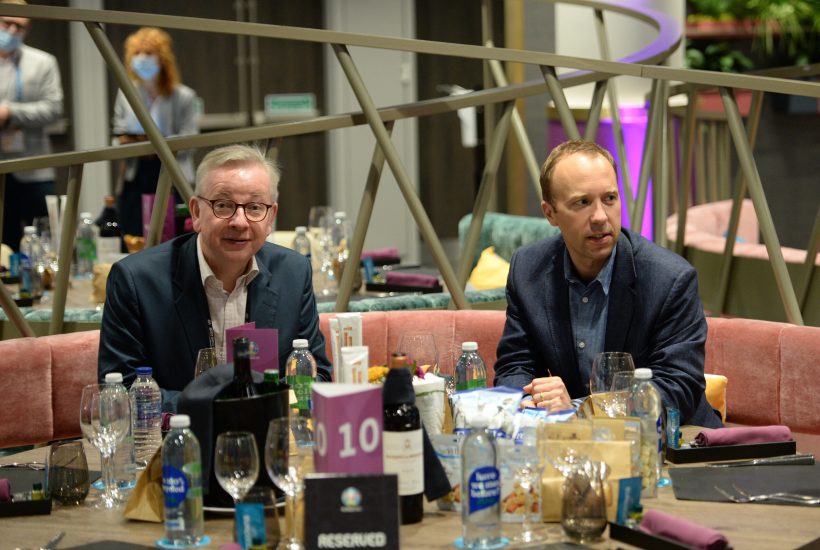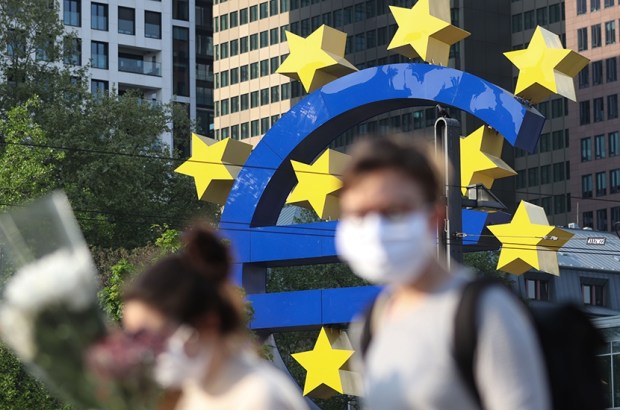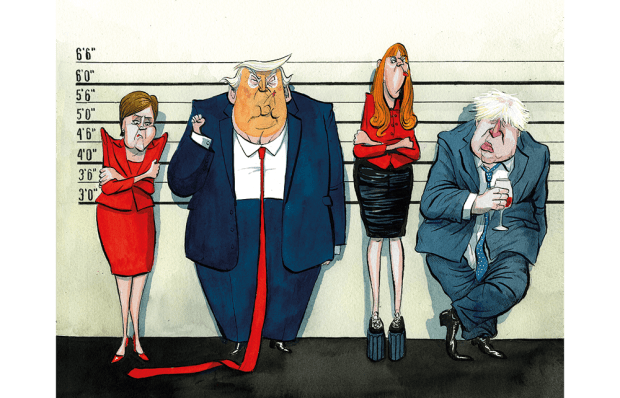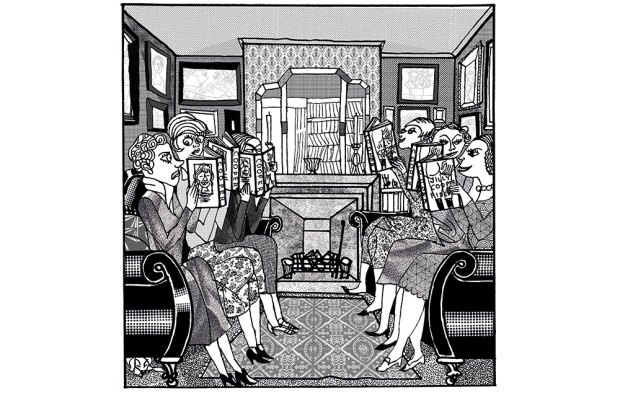This week was meant to be the moment when we could celebrate the return of freedom. Instead, we’re left still navigating a maze of rules. Couples are working out what a ‘Covid-secure wedding’ means (spoiler: no dancing or hugging). Family reunions — once planned for Christmas, then delayed to Easter — are being pushed back into the autumn. Birthday parties have been axed again. No one wants to break the law, or risk asking others to do so.
Ministers make a great show of obeying the rules. The weekend before Boris Johnson announced the delay to ‘freedom day’, he was bumping elbows with Joe Biden and Justin Trudeau at the G7 in Cornwall, posing for socially distanced photos. It was the picture of Covid security.
What the official photos didn’t show, however, was the behaviour behind the scenes. Long-lens cameras captured a far more relaxed affair, with no masks or social distancing in sight. ‘Was Cornwall exempt?’ jokes one government official who attended the summit. ‘There was no adherence to the rules.’ The event was a stark illustration of the new divide in Covid Britain between the restricted public and the party elite.
The third wave of Covid is currently spreading through the country, predominantly among the young. The Spectator’s data hub reveals this week that the median age for testing positive is now 26 — far below the dangerous age range for catching Covid-19. But normal life, we’re told, still can’t return. And if you’re pinged by Test and Trace, stay home, even if you’ve received both jabs. We all need to play our part to tackle the virus.
Unless you’re Michael Gove, that is. When he was pinged after returning from watching the Champions League final in Portugal, he found his way onto a pilot scheme which allowed him to test daily rather than self-isolate. Workers reliant on an hourly wage would surely like to take advantage of a scheme like this too, but such schemes aren’t well advertised to the general public.
The first lockdown was riddled with political casualties. Professor Neil Ferguson and Scotland’s chief medical officer Dr Catherine Calderwood resigned for breaching Covid laws. Dominic Cummings held a press conference in the Downing Street rose garden to defend his trip to Barnard Castle. Other ministers faced awkward questions about their own interpretation of the rules. This time round, there has been more leeway and fewer questions. Those familiar with the system — or indeed those who designed it — can normally find an exemption.
For months this year it’s been illegal to leave the country. Families and loved ones have been separated by unforgiving border controls. Matt Hancock announced in February a new law threatening ten years in jail for those who lie to avoid quarantine. While the explicit ban on travel has now been lifted, the so-called ‘green list’ includes only 11 countries, most of which won’t let us in. So options remain limited. Travel has become not just a bureaucratic nightmare but also expensive, thanks to all the testing required.
Unless you are a minister. Officials travelling for work purposes are exempt from quarantine (as well as testing), and many have not been shy about exploiting this ticket to ride. In April, when travel was banned and non-essential shops and outdoor dining were still closed, Wendy Morton in the Foreign Office found herself in Greece to hear — in a way that Zoom was apparently unable to convey — about the country’s plans to combat climate change. She even found time to tour the ancient Agora of Athens. Later that month, her colleague James Duddridge went to Nigeria, where he congratulated an anti-poaching squad ‘in person’.
Alok Sharma MP, meanwhile, made his way to Paris in March (and Kenya, and Costa Rica) to do some prep work for the government’s eco-jamboree COP26, of which he’s been appointed president. Never mind that the event is taking place in Glasgow. A lower-carbon video conference didn’t seem to appeal.
The list goes on. Trade Minister Greg Hands’s passport is getting plenty of use. He travelled to France and Germany last month to discuss the future of tech and business relations with officials, and was in Slovenia in March to talk trade policy. A trip to Croatia to tour the Rimac Automobili in Zagreb followed, and Hands seemed pleased to be there, particularly because it allowed him to reminisce on Twitter about his honeymoon in Croatia. He would have flown back to an England where, at the time, two people were just about to be allowed to sit together on a park bench.
There are plenty of legitimate reasons why a government official might have to make a trip abroad, even during a pandemic. But how many trips to the UAE, for example, are ‘essential’? Liz Truss’s trip to Dubai in April seemed sensible as she tried to develop trade links following Britain’s departure from the European Union — but it came just over a month after her junior minister Graham Stuart also travelled to the red-listed country to discuss ‘clean energy’.
No doubt plenty of ministers quietly wish we’d stuck to the 21 June timeline. But we don’t hear their rallying calls for freedom in parliament. Instead we see foreign minister James Cleverly’s trip to Tunisia posted on Twitter. He was there two weeks ago sampling fancy olive oil in the name of securing a ‘new trade agreement’.
When a child tests positive for Covid, the whole class goes home; when a colleague does, the office shuts down. Those are the rules, and the public abide by them. But when the Scottish footballer Billy Gilmour tested positive, no other player in the squad had to isolate. We’re told he hasn’t been in ‘close contact’ with teammates. It was a tough sell given that millions of people had watched him hugging several of his team during last Friday’s match.
Perhaps Gove and Hancock can shed some light: they both sat in a VIP area to watch England vs Scotland (Gove, as we know, is immune to being pinged). Nadhim Zahawi, the minister in charge of the vaccine rollout, enjoyed the football too. He shared a photo of himself at Wembley on 13 June, the night before Johnson delayed the last phase of reopening. This is all legal of course, but how did we get to the stage where politicians responsible for the roadmap reviews, hospital capacity and vaccine rollout can relax at the Euros when it’s apparently still too dangerous (and indeed illegal) to invite a seventh person into your home?
Ministers continue to issue work-from-home advice despite ignoring it themselves. They have discovered, as countless businesses have, that it’s hard for a team to function effectively if they aren’t all in the same building. Many ministers now have as big a team around them as in the old days (and have done for months), with little in the way of social distancing. ‘We gave it our best shot,’ says one senior official, but after weeks of rotas and Zoom meetings, it was decided that remote working wasn’t sustainable.
All perfectly sensible. As the pandemic raged and rapid decisions were being made, well-organised government was crucial. But rather than admit to adopting a more liberal regime in Whitehall, ministers have been putting on a Covid-secure performance. The mask is starting to slip, quite literally. Hancock was seen taking his mask off as he walked through the No. 10 door. This seems totally illogical, given that the virus is far less likely to transmit outside. He’s just keeping up appearances. Johnson was photographed without a mask behind a bar in a Hartlepool pub last month. How can you smile for the cameras while wearing the mask that bartenders are forced to wear?
Sir Keir Starmer didn’t even go through the motions of following the rules at Wembley. The Labour leader was pictured indoors, with no mask, chatting away. It’s very unlikely he did any harm, but the hypocrisy grates. When votes are taken to pass laws demanding mask-wearing for the rest of us, Starmer orders his MPs to support them.
Politicians have worked out how to circumvent the rules, which perhaps explains why there has not been more pressure to relax them for the rest of society. MPs can organise their own isolation rules, their own trips and even their own parties. And the festivities are starting to begin. Last month, NHS workers were given free tickets to the Brit Awards. What TV cameras missed was that in the boxes above them were politicians slurping champagne. The Brits have long been a Westminster freebie festival. Corporates send invitations to politicians whom they want to butter up. Little wonder, then, that the show was one of the first events in the government’s ‘Event Research Programme’ designed to test reopening of large gatherings. Liz Truss and Thérèse Coffey bravely volunteered to be guinea pigs, as did ministers James Cleverly, Paul Scully and Caroline Dinenage, along with many other MPs and Labour frontbenchers. There was no danger in ministers going to the Brit Awards. But neither would there be in allowing brides and grooms to have a standing drinks reception inside, or more guests on the dance floor.
Since the Brits, the list of ‘trial’ events has grown. If you have enough lobbying power to give the government a headache, your event, too, can become a pilot scheme. Wembley will now be three-quarters full for the Euro finals. This ‘scheme’ has come about because Uefa threatened to move the last matches overseas if the UK didn’t allow more capacity and quarantine exemptions for 2,500 VIP guests. After Andrew Lloyd Webber announced he’d risk arrest to open his West End show on 21 June at full capacity, the government offered the show ‘trial’ status. Lloyd Webber turned it down on the grounds of unequal treatment. He knows most people in the theatre industry don’t have his power or clout.
While the rules in a pandemic are always going to be crude and unfair, they’re more likely to be rectified if ministers are subject to the same regulations as everyone else. There are plenty of sensible experiments that go hand-in-hand with reopening, as well as exemptions to rules to ensure the government can keep functioning. But Boris Johnson could have told his ministers that, given the circumstances, he did not want to see a single one of them personally benefiting from these privileges, or taking advantage of a system that’s forcing everyone else to keep their lives on hold.
When liberty becomes a rationed resource, those with power always win. As the Prime Minister continues to reflect on when ‘freedom day’ will be delivered, and what liberties will actually be restored, he could perhaps look at his colleagues and think: what have they been up to? And might it be time to let the rest of the country do the same?
Got something to add? Join the discussion and comment below.
Get 10 issues for just $10
Subscribe to The Spectator Australia today for the next 10 magazine issues, plus full online access, for just $10.
You might disagree with half of it, but you’ll enjoy reading all of it. Try your first month for free, then just $2 a week for the remainder of your first year.















Comments
Don't miss out
Join the conversation with other Spectator Australia readers. Subscribe to leave a comment.
SUBSCRIBEAlready a subscriber? Log in